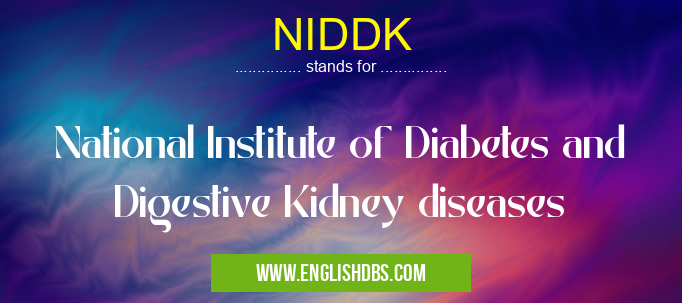What does NIDDK mean in NURSING
NIDDK is an acronym that stands for National Institute of Diabetes and Digestive and Kidney Diseases. It is one of the 27 Institutes and Centers that make up the National Institutes of Health (NIH). The NIDDK is responsible for conducting and supporting research on some of the most common, costly, and debilitating diseases in the United States.

NIDDK meaning in Nursing in Medical
NIDDK mostly used in an acronym Nursing in Category Medical that means National Institute of Diabetes and Digestive Kidney diseases
Shorthand: NIDDK,
Full Form: National Institute of Diabetes and Digestive Kidney diseases
For more information of "National Institute of Diabetes and Digestive Kidney diseases", see the section below.
Focus Keywords
- NIDDK meaning in MEDICAL
- NIDDK full form
- What does NIDDK stand for
Mission and Objectives
The NIDDK's mission is to improve people's health and well-being by conducting and supporting research on diabetes, digestive diseases, kidney diseases, and other endocrine and metabolic disorders. The Institute's objectives include:
- Conducting basic and clinical research on the causes, prevention, diagnosis, and treatment of diabetes, digestive diseases, kidney diseases, and other endocrine and metabolic disorders.
- Supporting research training and career development for scientists and health professionals in these fields.
- Disseminating research findings to the public and health professionals.
Research Activities
The NIDDK supports a broad range of research activities, including:
- Basic research on the molecular and cellular mechanisms of disease
- Clinical research on the development and evaluation of new therapies
- Population-based research on the prevalence and risk factors for disease
- Health services research on the delivery and effectiveness of health care
Impact
The NIDDK's research has led to significant advances in the prevention, diagnosis, and treatment of diabetes, digestive diseases, kidney diseases, and other endocrine and metabolic disorders. For example:
- NIDDK-supported research has led to the development of new drugs and therapies for type 1 and type 2 diabetes.
- NIDDK-supported research has helped to identify the genetic risk factors for Crohn's disease and ulcerative colitis.
- NIDDK-supported research has led to the development of new treatments for kidney failure.
Essential Questions and Answers on National Institute of Diabetes and Digestive Kidney diseases in "MEDICAL»NURSING"
What is NIDDK?
The National Institute of Diabetes and Digestive and Kidney Diseases (NIDDK) is a part of the National Institutes of Health (NIH) and is responsible for conducting research, training, health information dissemination, and supporting community programs on diabetes, digestive diseases, and kidney diseases, including urinary tract infections and related disorders.
What are the symptoms of diabetes?
Common symptoms of diabetes include frequent urination, excessive thirst, unexplained weight loss, increased hunger, fatigue, blurred vision, slow-healing sores, and tingling or numbness in the hands or feet.
What are the types of digestive diseases?
Digestive diseases include a wide range of conditions that affect the digestive system, such as gastroesophageal reflux disease (GERD), inflammatory bowel disease (IBD), irritable bowel syndrome (IBS), celiac disease, and pancreatitis.
What are the risk factors for kidney disease?
Risk factors for kidney disease include diabetes, high blood pressure, family history of kidney disease, smoking, obesity, and certain medications.
What are the treatment options for urinary tract infections (UTIs)?
Treatment for UTIs typically involves antibiotics to clear the infection. In some cases, additional medications may be prescribed to relieve pain or discomfort.
How can I prevent kidney stones?
To prevent kidney stones, it is recommended to drink plenty of fluids, limit sodium intake, maintain a healthy weight, eat a balanced diet rich in fruits and vegetables, and reduce animal protein consumption.
What are the warning signs of kidney disease?
Warning signs of kidney disease may include changes in urine output, such as decreased or excessive urination; swelling in the hands, feet, ankles, or face; fatigue; shortness of breath; and high blood pressure.
What is the role of NIDDK in public health?
NIDDK plays a significant role in public health by conducting research to better understand and treat diabetes, digestive diseases, and kidney diseases. It also provides health information to the public and supports community programs aimed at preventing and managing these conditions.
Final Words: The NIDDK is a world leader in research on diabetes, digestive diseases, kidney diseases, and other endocrine and metabolic disorders. The Institute's research has led to significant advances in the prevention, diagnosis, and treatment of these diseases, and has improved the lives of millions of people.
NIDDK also stands for: |
|
| All stands for NIDDK |
